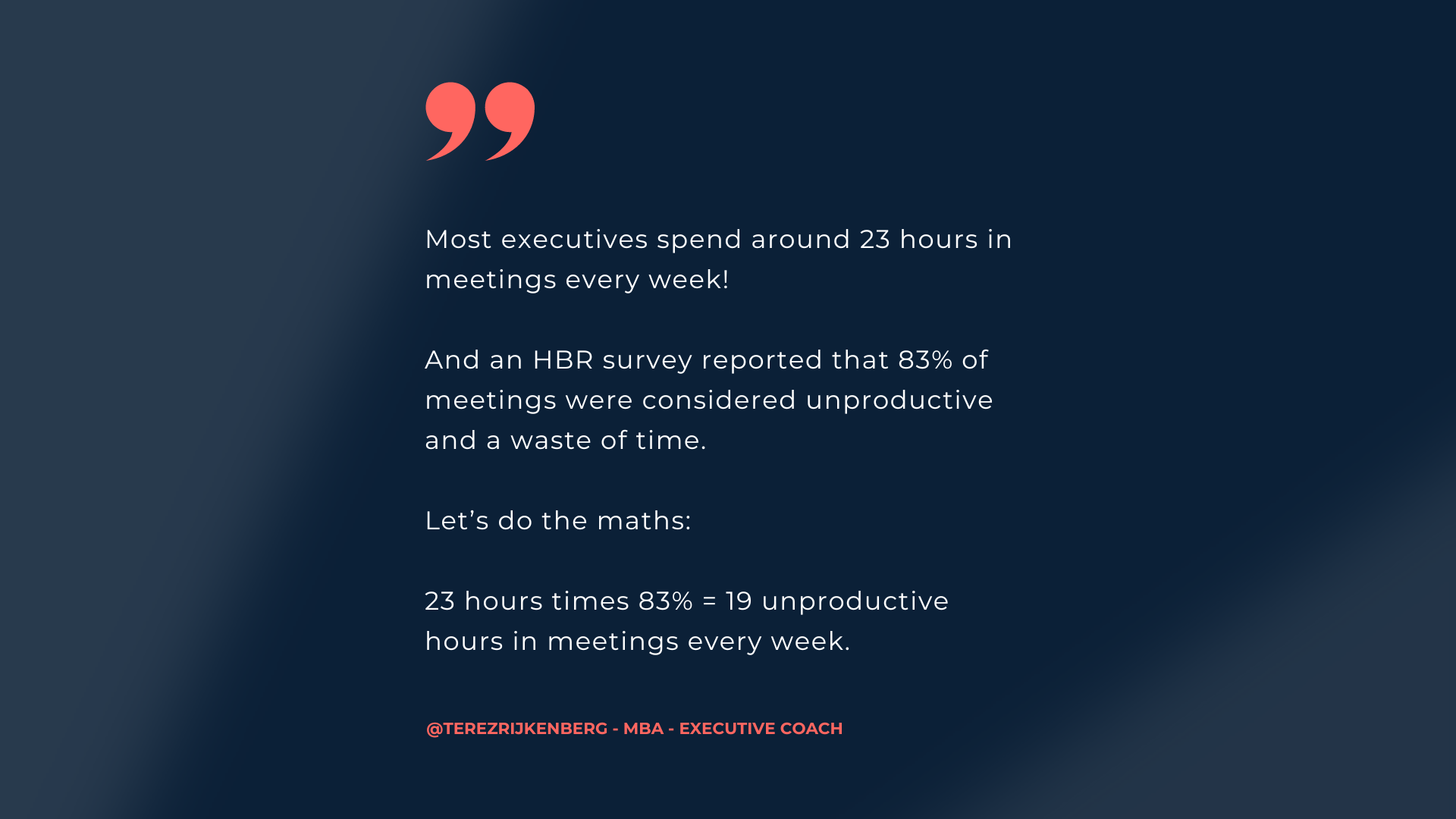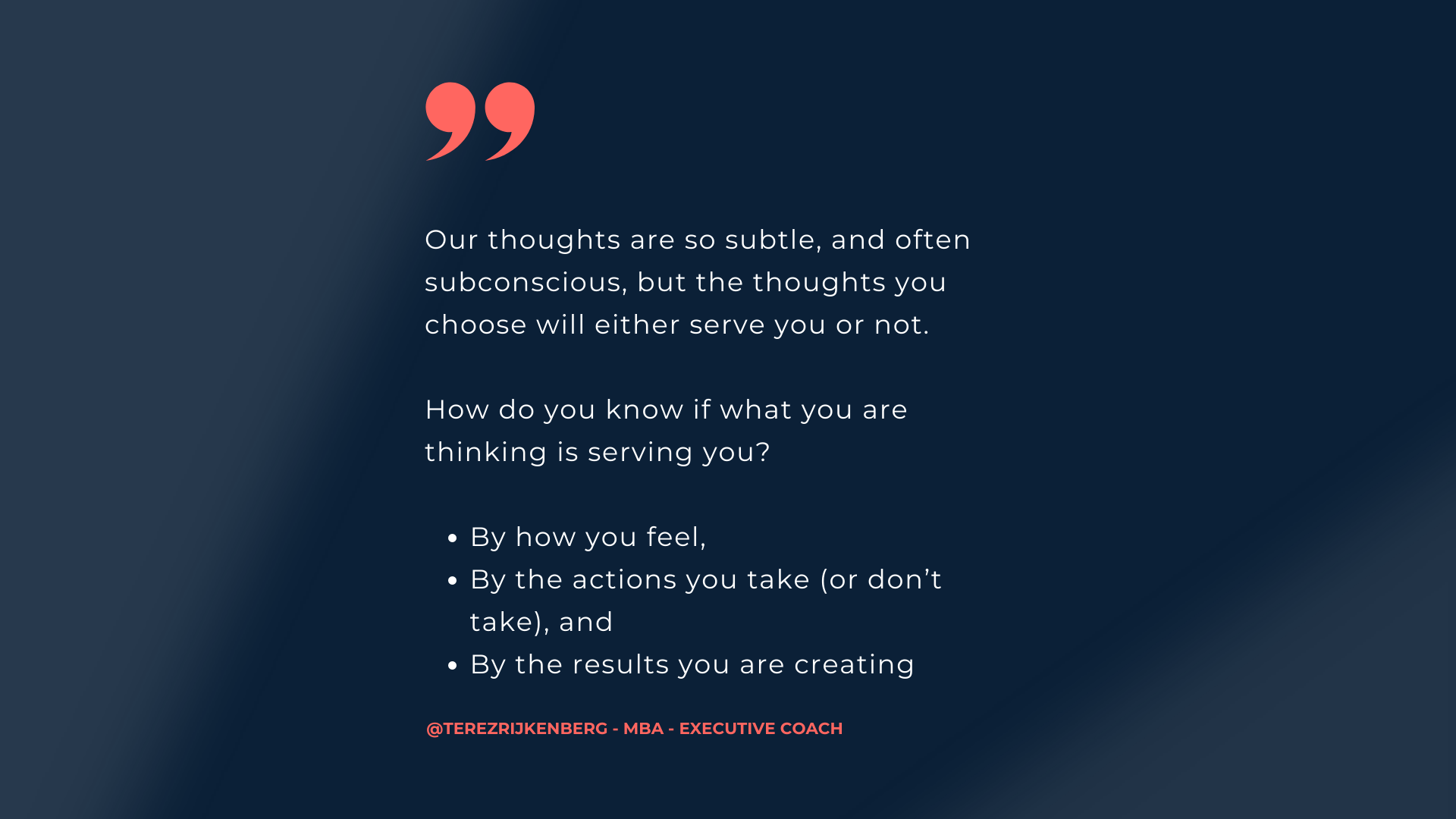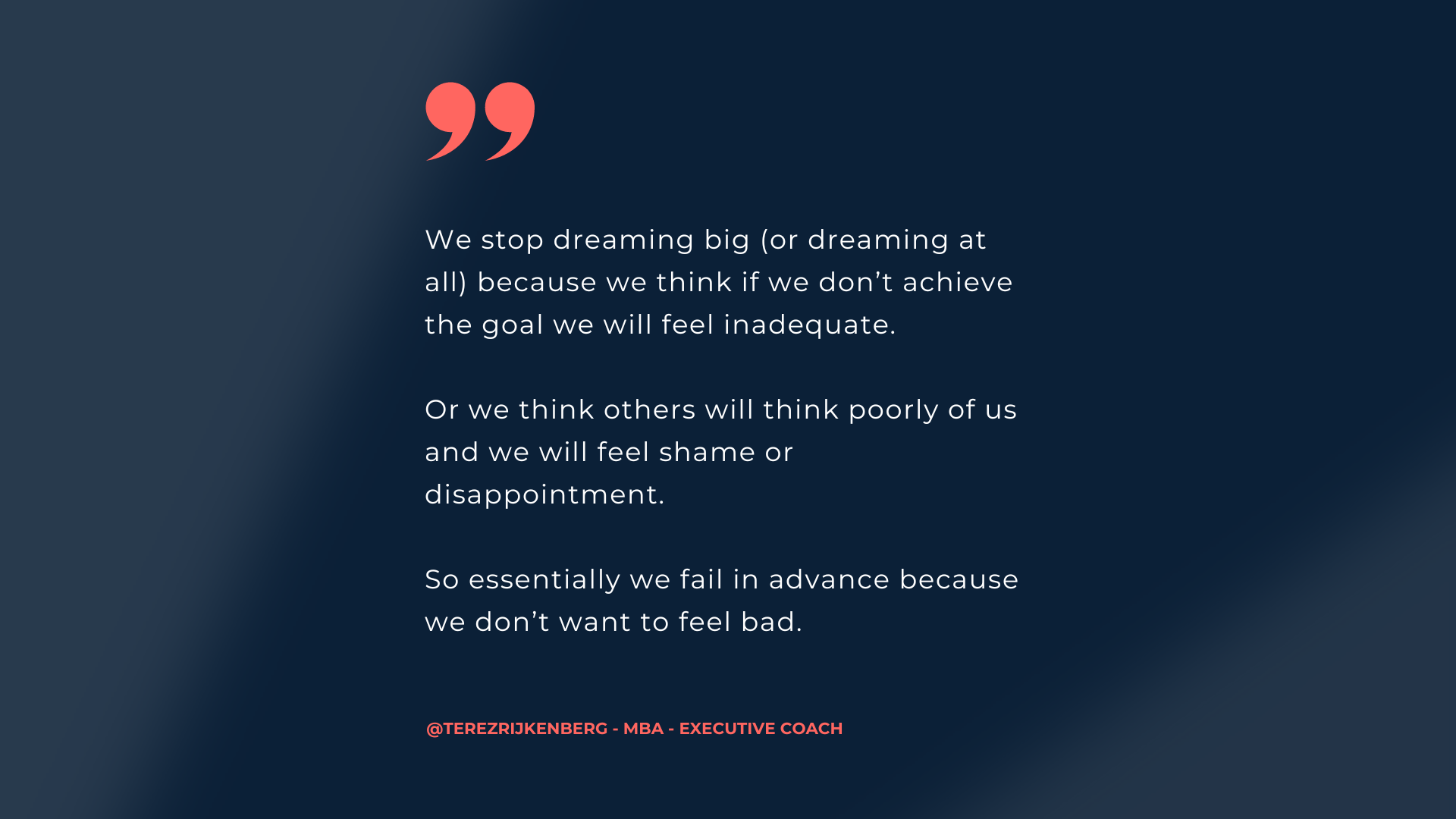<READING TIME: 10m42s>
Meetings, meetings, meetings.
Most executives spend around 23 hours in meetings every week!
And one HBR survey reported that 83% of meetings were considered unproductive and a waste of time.
Let’s do the maths:
23 hours in meetings times 83% unproductive ones = 19 wasted hours in meetings every week!
That’s 76 unproductive hours every month!
Imagine what you could do with that time?
This maths lesson isn’t over yet I’m afraid:
Now multiply 76 hours by the number of people in your team or your organisation?
Multiply that by 12 months?
Imagine the outputs and projects, products and customers you could deliver on if you cut back on just half of those unproductive meetings?
That’s not the only problem, if you find yourself catching up on your solo work after hours or on weekends, it’s probably because of the excessive number of meetings in your calendar.
This after-hours work quickly leads to increased stress and burnout and lowered work satisfaction.
The most productive and happiest executives guard their calendars like hawks and protect their time from unproductive meetings so that they have more time for deep work and strategic thinking.
So fear not, if meeting overload is what you’ve been experiencing, I’ve got you covered.
Here are 20 tips for dealing with meeting overload so that you can regain more of your time every week:
1 – Be happy to miss out
Meeting F.O.M.O. (fear of missing out) is a real thing. But it’s absolutely a mindset issue that is easily dealt with. First, realise that it’s OK to miss out on certain meetings and decisions. Your ability to produce success is also based on your ability to ignore a lot of other good opportunities including certain meetings.
2 – Be clear on your strategic goals and objectives and your specific activities to reach those goals
When you are crystal clear on your strategic goals and objectives and your role in achieving these, it will be a lot easier to say “no” to certain meetings that aren’t aligned with what you need to do.
3 – Always check in with yourself before accepting a meeting
Never click “accept” on a meeting before checking in with a few questions like: “Is this meeting essential to my strategic goals and role?”; “Is my attendance vital for the host to move forward with their objective?”; “Is there a clear agenda and objective to the meeting?”; “Is this meeting aligned to the priorities of the organisation?”; “Am I attending this meeting because it’s easy and I’m avoiding some other challenging work?” etc.
4 – Assess your underlying thoughts about meetings
As much as we all complain about meetings the reason you’re probably attending too many of them has to do with what you’re thinking about them. For example: “my boss likes me to attend this meeting” or “it’s only 30 minutes a week” or “I need to show my face or they’ll forget about me”.
You’ll only be able to change your actions around unproductive meetings or certain types of meetings when you change your beliefs about them. Coaching can help to uncover the limiting beliefs that keep you in the cycle of attending unproductive meetings.
5 – Cut down the default meeting length
Change all of your 1-hour meetings to 45 minutes and all of your 30-minute meetings to 20 minutes. Or request this change from the host. This reduced time will force people to get to the point of the meeting and move quickly towards the overall objective and decision.
6 – Never stay in a meeting beyond the completion of the agenda
Meeting objectives are often completed earlier than the meeting completion time, but very often we stay because it “might be rude” not to. It’s rude to waste time, and it’s rude to have to spend your personal hours catching up on work, so always leave a meeting as soon as the agenda or objective is completed.
7 – Get over the mindset that meetings are for relationship building
Yes, you may have a secondary objective to connect with people in meetings, but this is only a secondary objective. Don’t use this as an excuse to attend unproductive meetings that waste people’s time and frustrate them (and you). That’s hardly a great way to build relationships. If you want to foster great relationships with your team and colleagues ask yourself “how can I build better relationships with my team” and brainstorm some impactful ways you could do this where relationship building is the primary objective.
8 – Nip unproductive meeting behaviours in the bud
You’re the leader so be the one to call people out wherever you notice them wandering off topic or presenting problems without solutions or blaming other people or teams. Those behaviours don’t move anyone forward and add to a negative culture and atmosphere in the meeting room. Rather direct people back to the topic and call them out for excessive complaining or blaming.
9 – Create your own meeting boundaries
Be sure to set clear boundaries for yourself around the meetings you will or won’t attend. For instance: “If the meeting doesn’t include an objective and agenda then you won’t accept the invitation”. Communicate these boundaries to your team and be sure to uphold them 100% of the time.
10 – Create your own impromptu meeting boundaries
Imprompt meetings can be incredibly disruptive especially when you are busy with deep work. Be sure to create and communicate your boundaries around impromptu meetings with your team and colleagues. For example: “Employees and colleagues must always bring at least 3 solutions to the problem they present to you in an impromptu meeting”.
11 – Experiment with a “no meeting period”
Experiment with just yourself or with your team or organisation where a certain period of time is set where people cannot set up meetings or appointments. And keep that time blocked for solo work only. For example, You could set up a “no meeting period” between 8-10 am every morning. Or you could experiment with a “no meeting day” such as every Friday. (As an aside, this could also help you test out what it would be like to be a 4-day work week organisation.)
12 – Provide your meeting input before and/or after a meeting
You can still participate in meetings without attending them. Do this by providing your input and questions to the host before the meeting, and/or you can gain their feedback from the meeting afterwards in a quick 5-min chat or request an email update from them.
13 – When setting up a meeting, invite only the people that are essential to achieving the set objective
If you think someone is optional for a meeting then don’t include them on the invite list. For project-type meetings (i.e. not 1-to-1 meetings) keep the number of invitees to between 5 – 8 people for maximum creativity and decision making. For people who are optional to a meeting, you can provide them with the notes afterwards. Check-in with yourself if you feel “bad” about not inviting someone – feeling “bad” is not a good enough reason to waste people’s time.
14 – Schedule meetings to start with a verb
By scheduling all meetings with a verb you are encouraging yourself to think about what you want the meeting to produce or the outcome you are looking for. For example: “Decide on…” or “Finalise the…”
15 – Always question “review” or “catch-up” meetings
Most “reviews” can be done during solo work time outside of a meeting and “catch-ups” are a sure way to have a conversation that could be a waste of everyone’s time. Be sure to ALWAYS request clarity from the host on these types of meetings before accepting them.
16 – Get into the habit of planning meetings in advance as much as possible
For advanced productivity, I recommend to my clients to plan as much as they can in advance as much as possible. Planning in advance reduces costs (monetary as well as resource and time costs) because it reduces urgency. Think about the meetings you may or may not need within the next 3 months and keep a close watch on your upcoming weeks to prepare yourself for what’s ahead. You can always cancel meetings if they aren’t needed closer to the time.
17 – Delegate more meetings
Some meetings can be a great opportunity to empower your team, so delegate more meetings to them. Be sure to communicate your requirements before they attend a meeting on your behalf.
18 – Delay more meetings
Just because you have time doesn’t mean you should accept a meeting today or this week. Be willing to delay meetings into the future. Use the MoSCoW method to assess your meetings by must, should, could or won’t. Ask yourself: “Which meetings MUST I attend this week?” and give preference to those. Ask yourself: “Which meetings SHOULD I do this week and which meetings COULD I do this week?” and be willing to delay those for next week or later.
19 – Delete more meetings
Just because a meeting is on your calendar doesn’t mean you still need to attend it. When reviewing your week ahead keep asking the question of whether each meeting you have accepted is still necessary to attend based on your strategic goals and objectives.
20 – Experiment with other ways to make your meetings more productive
Keep assessing how productive the meetings you attend are based on your goals and role. And keep making small tweaks and adjustments to make the meetings you attend even more productive and to reduce the number of meetings that aren’t. This will be an ongoing process – but the boundaries that you have set for meetings will keep you on track. If you attend a meeting that you feel was unproductive, ask yourself these questions:
- “Why was the meeting unproductive?”
- “Why did I attend that meeting?”
- “What could be better next time?”
TAKE ACTION:
- Use the steps above to set boundaries for meetings you will or won’t attend and communicate these with your team and colleagues.
- Share this list with others in your organisation so that everyone can work towards reducing unproductive meetings.
- COACHING: If you need 1-to-1 support to overcome meeting overload for good, then book a free consultation with me here.





